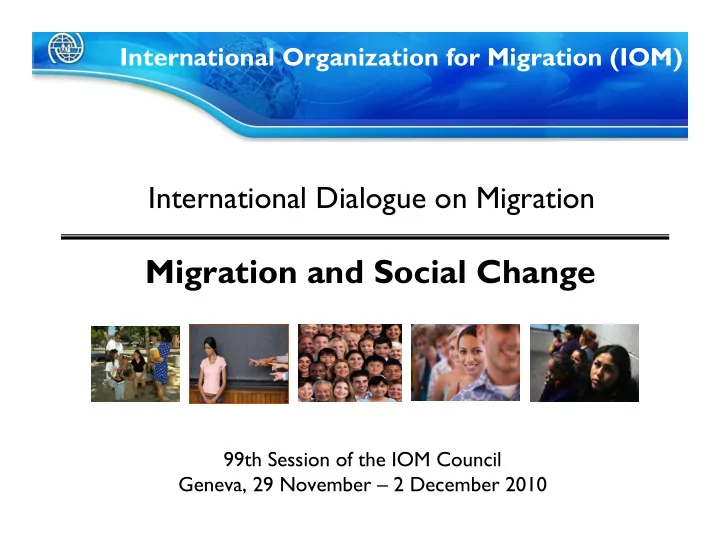

International Organization for Migration (IOM) International Dialogue on Migration Migration and Social Change 99th Session of the IOM Council Geneva, 29 November – 2 December 2010
International Dialogue on Migration 2010 First workshop “Migration and Transnationalism: Opportunities and Challenges” (9-10 March 2010) Second workshop “Societies and Identities: The Multifaceted Impact of Migration” (19-20 July 2010)
Migration and Social Change – A Context Migration is an evolving social process that connects people, societies and cultures. The dynamism of human mobility creates new spaces for interaction among people of origin and destination countries. Migrants’ transformative role contributes to change in social structures, norms, attitudes and practices.
Lessons Learned The challenge is how to manage inevitable changes occurring due to migration. 1. Migration is one of many drivers of social change. 2. Transnational dynamics are a key characteristic of contemporary migration.
Lessons Learned 3. Migrants are both agents and subjects of transnationalism. 4. Migration also affects non-migrants in countries of origin and destination. 5. Maintaining cohesive societies in face of greater mobility / diversity is fundamental.
Lessons Learned 6. Managing perceptions of migrants and migration is crucial for social cohesion. 7. The concept of integration needs to be revisited in light of changing migration dynamics and other parameters.
Approaches for Policymakers First, minimize misperceptions of migrants and migration Sensitize public to negative and false images of migrants and migration Call upon media for objective and accurate reporting Support media by and for migrant or ethnic minority communities
Approaches for Policymakers Second, mobilize initiatives to increase migrants’ social participation, particularly at the local level Focus on building local citizenry Support local leadership and community-tailored initiatives Increase interaction between migrants and their communities of origin
Approaches for Policymakers Third, institutionalize mechanisms to enhance political participation of migrants Countries of destination: - Local political rights and participation - Innovative youth engagement Countries of origin: - Out-of-country voting - Regular consultations with / representation of the diaspora
Approaches for Policymakers Fourth, adopt policies to support different migrant groups Countries of origin: - Education about rights and responsibilities - Pre-departure orientation Countries of destination: - Key services and institutions accessible in different languages and to different cultural groups
Approaches for Policymakers Fifth, expand cooperation to ensure policy coherence and effectiveness Cooperation at every level Partnerships with non- governmental actors and sharing of best practices
Approaches for Policymakers Sixth, implement measures to minimize the negative impacts of migration on families Countries of origin: - Psychosocial assistance for spouses and children - Skills training and access to economic opportunities Countries of destination: - Support to migrant families - Attention to 1.5th, 2nd and 3rd generation
Conclusion Growing transnational migration will continue to change social fabrics of both origin and destination countries Managing social changes and challenges more effectively and coherently is fundamental for making migration beneficial A way forward: I. Revisit migration policy (origin and destination countries) taking into account the transnational dimension of human mobility II. Mobilize society to counter anti-migration sentiment, smoothing the integration process III. Support migrants, their families and home and host communities
Recommend
More recommend